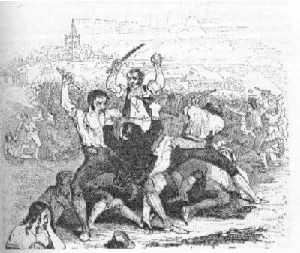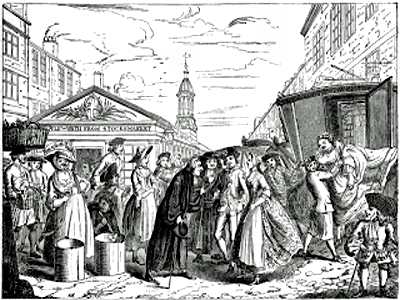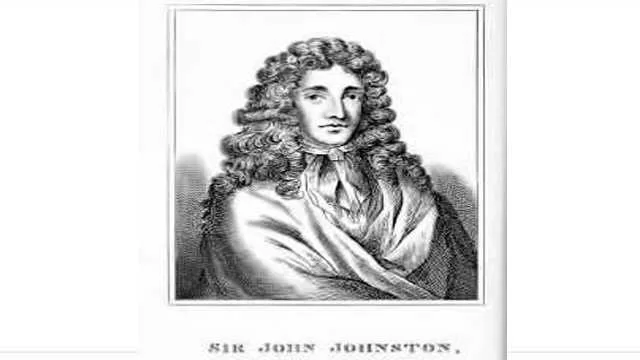“It is a truth universally acknowledged that a single man in possession of a good fortune must be in want of a wife.” This iconic line from Jane Austen’s Pride and Prejudice encapsulates the societal norms of her time, where marriage was often seen as a strategic alliance rather than a romantic union.
If we accept Austen’s premise, it follows that a single woman with wealth must also be in search of a husband. This notion was not lost on many men in history, including the notorious Captain Sir John Johnston, whose desperate pursuit of an heiress led to a scandal that would echo through the ages.
Pursuit of Wealth Through Marriage
Born in Fifeshire, Scotland, Captain Sir John Johnston was a man of ambition and military experience, having fought under the Duke of Monmouth at the siege of Maestricht and the Battle of the Boyne. However, despite his gallant past, Johnston found himself in dire financial straits. In a bid to improve his fortunes, he set his sights on Miss Magrath, an heiress from County Clare, Ireland, who had an inheritance of £10,000—a considerable sum in the late 17th century.

Johnston ingratiated himself with Miss Magrath’s family, receiving numerous dinner invitations and attempting to win her affections. However, her uncle, Mr. Magrath, grew suspicious of Johnston’s intentions and eventually banned him from their home. Undeterred, Miss Magrath, infatuated with Johnston, attempted to communicate with him through a kinswoman. Unfortunately for her, the kinswoman chose to inform Mr. Magrath instead, leading to further complications.
A Failed Elopement
In a dramatic turn of events, Johnston set out to meet Miss Magrath at a prearranged location, only to be ambushed by men employed by her uncle. They beat him mercilessly, forcing him to promise to leave both County Clare and Miss Magrath behind. Defeated, Johnston fled to Dublin, where he quickly accumulated debts that landed him in debtor’s prison.
While incarcerated, Johnston reached out to Lady Thomond, a devout Roman Catholic, asking her to send a priest for reconciliation with the Church. However, upon the priest’s arrival, Johnston betrayed him, extorting money under the guise of loyalty to the Crown. This unscrupulous act allowed Johnston to settle his debts and escape to England, where he would soon find himself embroiled in another scandal.
Marriage of Miss Mary Wharton
In England, Johnston encountered Captain James Campbell, the son of the ninth Earl of Argyle, who had his own designs on an heiress—Miss Mary Wharton. At just thirteen years old, Miss Wharton inherited a fortune worth over £50,000 upon her father’s death. On the evening of November 10, 1690, Campbell arrived at her aunt’s home in a grand coach, bearing gifts, and soon whisked the young heiress away to marry her in secret.

The marriage took place in a coachman’s house, with Johnston and another man as witnesses. The ring Campbell brought was too large for Miss Wharton’s finger, but she insisted on wearing it, wrapping a ribbon around her finger to make it fit. After the ceremony, the newlyweds retired to their chamber, seemingly blissful in their union.
Outrage and Royal Intervention
The following morning, Johnston suggested that Miss Wharton inform her aunt of her marriage. She wrote a letter assuring her aunt that she was well and happy with her new husband. However, the news of the marriage quickly reached her relatives, who were outraged. Lord Wharton, a close kinsman, sought royal intervention, leading to a proclamation for the arrest of Campbell and his accomplices on charges of kidnapping.
While Campbell fled to Scotland, Johnston was betrayed by his landlord, who turned him in for the reward. On December 11, 1690, Johnston was tried at the Old Bailey. Despite evidence that Miss Wharton had not been coerced, the court found Johnston guilty, and he was sentenced to death.
Execution of Sir John Johnston
On December 23, 1690, Johnston was taken to Tyburn in a mourning coach, accompanied by a hearse. He stood on the back of a cart, addressing the crowd and declaring his innocence. As he prayed and recited Psalms, the rope was placed around his neck, and the cart was drawn away, ending his life in a tragic culmination of ambition and betrayal.
Three weeks after the wedding, a bill was introduced in the House of Commons to annul the marriage between Campbell and Miss Wharton. Despite opposition from the Earl of Argyle, the bill passed swiftly. Miss Wharton later married Colonel Robert Bierley, the son of her guardian, while Campbell went on to marry another heiress, escaping any punishment for his actions.
A Poignant Reflection
The ballad Sir John Johnston’s Farewell, penned by Jo. Haines, captures the essence of Johnston’s plight, lamenting the fate of a man who sought fortune through love but ultimately met a tragic end. The story resonates through the ages, reminding us that the pursuit of wealth can lead to unforeseen consequences, and that love, when intertwined with ambition, can sometimes lead to ruin.
Conclusion: Lessons from History
The tale of Sir John Johnston serves as a cautionary story about the lengths to which individuals will go in pursuit of wealth and status. It highlights the societal pressures surrounding marriage and the often tragic consequences of ambition unchecked by morality. In a world where financial stability often drives personal relationships, the lessons from Johnston’s life remain relevant.
As we navigate our own societal expectations, it is essential to remember the importance of integrity and genuine connection over mere financial gain. The story of Johnston and the heiresses he pursued serves as a reminder that true happiness cannot be bought, and that the heart’s desires often lead us down unexpected paths. In the end, love and ambition must be balanced with ethics and respect for others, lest we find ourselves facing the same tragic fate as Sir John Johnston.

